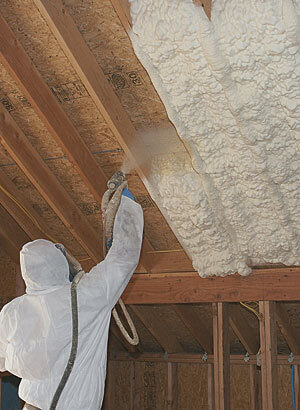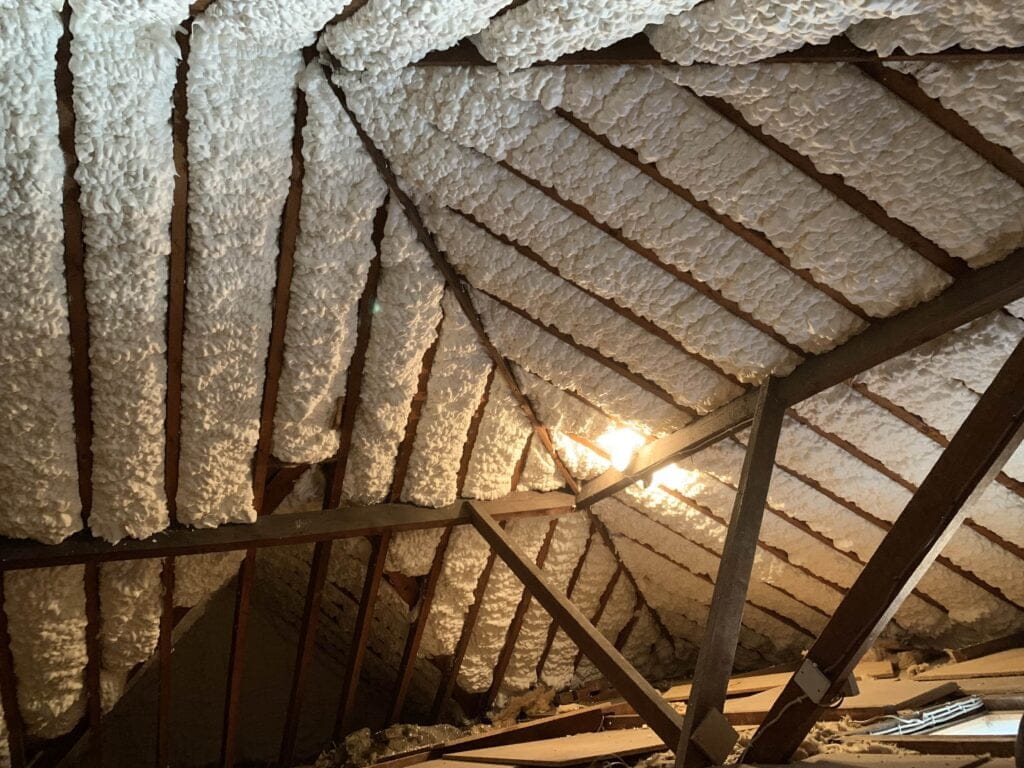Understanding the Benefits of Using Spray Foam for Insulation Projects
Understanding the Benefits of Using Spray Foam for Insulation Projects
Blog Article
Spray Foam: The Ultimate Remedy for Air Sealing and Insulation
Spray foam insulation has actually arised as a leading remedy for reliable air sealing and thermal insulation, offering a distinct combination of properties that set it apart from typical approaches. Understanding the complete extent of its advantages, installment procedures, and contrasts with various other insulation types is important for making notified decisions.
What Is Spray Foam?
Spray foam is a versatile insulation product that incorporates the concepts of air sealing and thermal resistance to enhance power performance in buildings. Composed largely of polyurethane or various other comparable substances, spray foam is applied as a fluid that expands upon call with surfaces, creating a strong, continuous layer of insulation. This unique property permits it to fill up gaps, splits, and spaces that traditional insulation products might neglect, providing a premium air seal.
There are 2 main kinds of spray foam: open-cell and closed-cell. Open-cell spray foam is lighter and a lot more flexible, offering superb noise absorption and a reduced R-value per inch - Spray Foam. On the other hand, closed-cell spray foam is denser, providing a greater R-value, moisture resistance, and added structural honesty to building elements
The application process usually entails customized devices, ensuring a seamless application that abides by different substratums, including wood, steel, and concrete. This versatility makes spray foam ideal for both new building and constructions and retrofitting existing structures. Its capacity to create an airtight obstacle considerably adds to lowering energy intake and boosting interior air quality, consequently making it a preferred choice among builders and property owners alike.
Advantages of Spray Foam Insulation
One of the most considerable benefits of spray foam insulation is its extraordinary capacity to develop a continuous air obstacle, which properly minimizes energy loss. Unlike standard insulation products, spray foam increases to fill spaces and fractures, ensuring that air leakage is substantially reduced. This characteristic not just boosts power efficiency but likewise results in reduce energy bills gradually.
Furthermore, spray foam insulation supplies superior thermal resistance, adding to an extra secure interior atmosphere. Its high R-value per inch permits effective insulation in confined rooms, making it ideal for attics, wall surfaces, and crawl rooms. Moreover, the moisture-resistant homes of spray foam help prevent mold and mildew and mold growth, advertising healthier living problems.
One more crucial benefit of spray foam insulation is its sound-dampening qualities (Spray Foam). It properly minimizes noise transmission in between rooms, developing a quieter and a lot more comfy home environment. The resilience of spray foam additionally sticks out, as it does not sag or resolve gradually, maintaining its efficiency throughout its life-span
How Spray Foam Functions
Comprehending how spray foam insulation works is important for valuing its effectiveness in air securing and thermal resistance. Spray foam insulation includes 2 primary elements: isocyanate and polyol material. When these elements are combined, they undertake a chemical response that causes the material to increase quickly, creating a thick foam that fills splits, cavities, and spaces.
As the foam expands, it adheres to surface areas, creating an airtight seal that substantially decreases air seepage. This particular makes spray foam insulation highly effective at protecting against drafts and moisture penetration, which can result in power loss and damage in time. Furthermore, the closed-cell version of spray foam supplies exceptional thermal resistance as a result of its inflexible framework, effectively reducing warmth transfer.
The unique homes of spray foam enable it to comply with irregular surface areas, making sure thorough insurance coverage and a smooth obstacle. Consequently, spray foam insulation not just boosts power effectiveness however likewise adds to enhanced interior air top quality by lowering the build-up of contaminants and allergens. Ultimately, understanding the technicians behind spray foam emphasizes its duty as a premium selection for insulation and air securing in both business and domestic applications.
Installation Refine Review

Before installment, the space needs to be properly cleaned and prepped, making sure that surfaces are devoid of dust, moisture, and debris. This action is important due to the fact that contaminants can compromise bond and general efficiency. As soon as the area is prepared, the application involves mixing the two elements of the spray foam, which increases upon call and loads voids efficiently.
Trained experts must carry out the installment, making use of customized tools to ensure uniform protection and ideal thickness. Safety and security precautions, including wearing protective gear and making certain correct air flow, are necessary throughout this procedure. After application, the foam typically treatments promptly, creating a solid barrier that enhances power effectiveness.
Contrasting Spray Foam to Conventional Insulation
When reviewing insulation choices, spray foam insulation stands out in comparison to traditional products such as fiberglass and cellulose. Unlike fiberglass and cellulose, which can enable air seepage, spray foam broadens upon application, loading voids and crevices to create an airtight seal.
In addition, spray foam gives a greater R-value per inch than typical insulation kinds, offering more reliable thermal resistance in a thinner account. This characteristic is particularly useful in areas with restricted dental caries deepness. Spray foam is resistant to moisture and mold and mildew development, which can be a considerable problem with cellulose and fiberglass, particularly in damp settings.
However, spray foam insulation typically brings a greater ahead of go to this site time cost than its typical counterparts. House owners must weigh this preliminary financial investment versus long-term power savings and performance advantages. Ultimately, while both insulation kinds serve their objective, spray foam arises as a more sophisticated solution for modern insulation requirements, especially in regards to air securing and thermal efficiency.

Conclusion
In summary, spray foam insulation represents a highly effective remedy for achieving optimal air securing and thermal resistance. Its one-of-a-kind residential or commercial properties, including moisture resistance and sound dampening, make it appropriate for different applications in both new buildings and retrofitting jobs (Spray Foam). Although the preliminary expenses may be my sources greater contrasted to traditional insulation materials, the lasting advantages, such as significant energy financial savings and boosted interior air high quality, validate the financial investment and emphasize its value in modern building techniques.
Spray foam insulation has actually emerged as a leading solution for reliable air securing and thermal insulation, using a distinct mix of buildings that establish it apart from traditional techniques.Spray foam is a functional insulation material that combines the concepts of air sealing and thermal resistance to improve energy efficiency in buildings.When examining insulation alternatives, spray foam insulation stands out in contrast to traditional products such as fiberglass and cellulose. Inevitably, while both insulation types offer their function, spray foam arises as a much more sophisticated remedy for contemporary insulation needs, especially in terms of air securing and thermal efficiency.
In summary, spray foam insulation stands for a very effective option for achieving ideal air securing and thermal resistance.
Report this page